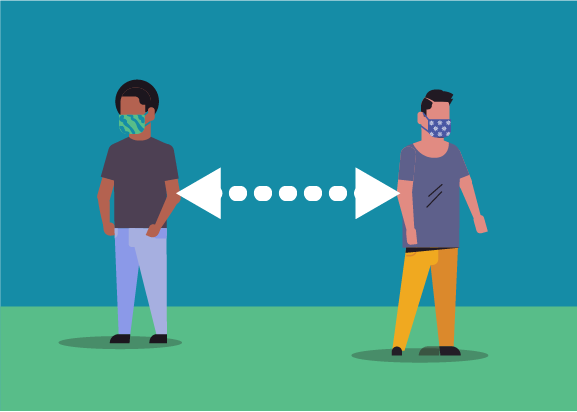By Aly Millane
During this confusing and scary time where some may say that even going to pick up a prescription entails risking your life, millions of people have began to practice what is known as social distancing. This term generally means doing what one can to slow the spread of a disease- in this case covid-19. I conducted interviews with three very different people to get their input of just how helpful social distancing and isolation may or may not be.
When asked about social distancing, all three said they try to practice it; each in similar ways. “I wear a mask, stand six feet apart in line, [if] I see my friends I’m making sure I’m washing my hands constantly or using hand sanitizer” said nineteen year old student Marley when questioned on the topic. Some may say that social distancing even means completely avoiding seeing friends or extended family. One who would agree on that concept is thirty-two year old registered nurse Shaylyn who said, “I don’t see my friends and family. On a very special occasion like mother’s day I will see my mom, but stand six feet apart.” It’s arguable that not being with friends or family could have a negative effect on one’s mentality as Marley mentioned in her interview, stating that isolation could make people depressed. When sixty-three year old teacher Judy was interviewed, her major way of social distancing consisted of maintaining a six foot distance from people as well. The main idea I received from this question was that none of those interviewed practice complete isolation within a quarantine, but still practice ways to avoid the virus.
Taking into consideration that isolation is not a priority for these three women during this outbreak, I wondered- what do they think about those who do isolate themselves? Do they think they are helping or harming themselves? “They are being safe and are scared of catching corona virus. They must be very lonely though, hopefully they at least see their immediate families,” said Shaylyn, whose answer correlated with Marley’s. Both seem to believe that those isolating are doing what’s right physically, but mentally they could be suffering. When Judy was asked, she said that they’re doing the right thing for themselves. None of those interviewed believed that those isolating were overreacting.
“Once it’s over, it will go back up again”
..
Those answers had me thinking if isolation was worth the loneliness- does it even have an effect on the numbers of the infected? I asked, if everyone was in quarantine, would the number of those with the virus decrease? They all said yes. Although, Marley brought up a valid point saying, “Once it’s over, it will go back up again”- referring to the quarantine being over and the numbers of those being sick increasing again. So, is the desolation of quarantine even worth it if as soon as everything goes back to normal, the spread will continue? That’s debatable.
Since everyone answered yes that isolation would slow or even stop the spread of covid-19, I wondered if they would stick by their word. I asked if they believed they’re contributing to the spread of the virus and ultimately the death of thousands by not isolating themselves. All of them, surprisingly to me, answered yes. Another unanimous answer resulted when they were asked if that bothered them. In their own way, they all said no or that they don’t think about it. “It doesn’t bother me because I’m doing the best I can; following the guidelines the best I can,” said Judy. Which is all one can do at this time. Almost everyone has essential reasons to leave their house, so at the end of the day there is no way for everyone to completely isolate.
Hearing these opinions on isolating and quarantine led to the inevitable question of the opposite. What are their thoughts on those who continue to go out with potentially sick people all the time? “They are dumb and inconsiderate,” said Marley who had short but similar answer to the others. “I think they are being dumb, it’s a new virus we never dealt with before, it’s really risky for their own lives and the lives of others,” said Shaylyn who touched on the subject that this virus is completely new, and no one truly knows all the effects it may have.
Overall, these interviews were very similar even though they came from completely different people. So the question comes back up- does social distancing and isolation hurt more than it helps? The only answer that can be given through these interviews is that it depends. Complete isolation leads to possible damage on one’s mental state, while lack of leads to possible contraction or spread of the corona virus. Basically, there should be an in-between of the two extremes so that mentality isn’t affected, but the spread of the virus slows at the same time.














